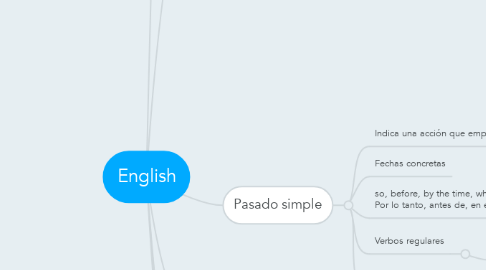
1. Conditional
1.1. Zero Conditional
1.1.1. describe lo que sucede en general .
1.1.1.1. si se sienta en el sol, se quema if you sit in the sun, you get burned
1.1.1.1.1. Estoy hablando cada vez que una persona se sienta en el sol - la quema es una consecuencia natural de la sesión
1.2. First conditional
1.2.1. Se usa para hablar de las cosas que podrían ocurrir en el futuro if + present simple...will + infinitive
1.2.1.1. if you sit in the sun, you'll get burned si se sienta en el sol, usted se quema
1.2.1.1.1. En este caso estoy hablando de lo que sucederá hoy, otro día puede ser diferente
1.2.1.2. If it rains, I won't go to the park. Si llueve , no voy a ir al parque.
1.2.1.3. If I study today, I'll go to the party tonight. Si estudio hoy, iré a la fiesta de esta noche.
1.2.1.4. If I have enough money, I'll buy some new shoes. Si tengo suficiente dinero, voy a comprar unos zapatos nuevos.
1.2.1.5. She'll be late if the train is delayed. Ella va a llegar tarde si el tren se retrasa.
1.2.1.6. She'll miss the bus if she doesn't leave soon. Ella se perderá el autobús si ella no se va pronto.
1.2.1.7. If I see her, I'll tell her. Si la veo, se lo diré.
1.2.1.8. If she studies harder, she'll pass the exam Si se estudia con más fuerza, pasará el examen
1.2.2. describe una determinada situación
1.3. Second Conditional
1.3.1. puede como no puede pasar es subjetivo desde el punto de vista personal
1.3.1.1. If she studied harder, she would pass the exam Si ella estudia con más fuerza, podría pasar el examen
2. Presente simple Afirmaciones
2.1. Acciones frecuentes o situaciones permanentes que se hacen todo el tiempo (afirmaciones)
2.2. Pronombres
2.2.1. I We You They
2.2.1.1. verbo tradicional
2.2.2. Terceras Personas
2.2.2.1. He She It
2.2.2.1.1. "se le agrega una S."
2.2.2.1.2. Terminaciones
2.2.2.1.3. Excepciones "no sigue las reglas"
3. Pasado simple
3.1. Indica una acción que empezo y termino
3.2. Fechas concretas
3.3. so, before, by the time, when Por lo tanto, antes de, en el momento, cuando
3.4. Verbos regulares
3.4.1. Para formar el pasado simple, simplemente añadimos "ed" al final del verbo.
3.5. Verbos irregulares
4. Pasado perfecto
4.1. Se usa para contrastar dos acciones del pasado
4.2. after (+frase), as soon as, because, already, up to then, before that day después (+ frase), lo más pronto, porque, ya, hasta entonces, antes de ese día
5. Negations "Tiempo presente simple"
5.1. To be
5.1.1. am not
5.1.2. is not
5.1.3. are not
5.2. other verbs
5.2.1. sujeto(he, she, it)
5.2.1.1. does not - doesn't
5.2.1.1.1. verbo
5.2.2. sujeto(I, They, we)
5.2.2.1. do not - don't
5.2.2.1.1. verbo
5.2.3. se pierde la "s" al final del verbo al convertirla en negación
6. Preguntas negativas
6.1. Do you want to go? ¿Quieres ir?
6.1.1. Don't you want to go? ¿No quieres ir?
6.2. Does it work ¿Funciona?
6.2.1. Doesn't it work ¿No funciona?
7. hablar del futuro verbo auxiliar "will"
7.1. I will swim. = Nadaré. I'll swim. = Nadaré.(Contracción)
7.2. I will not swim. = No nadaré. I won't swim. = No nadaré.
7.3. Preguntas
7.3.1. Para formar una pregunta, ponemos "will" primero, luego el sujeto, y luego el verbo.
7.3.2. will
7.3.2.1. sujeto
7.3.2.1.1. verbo
7.3.3. Will you swim? = ¿Nadarás?
